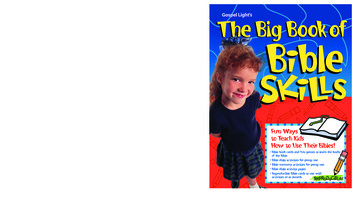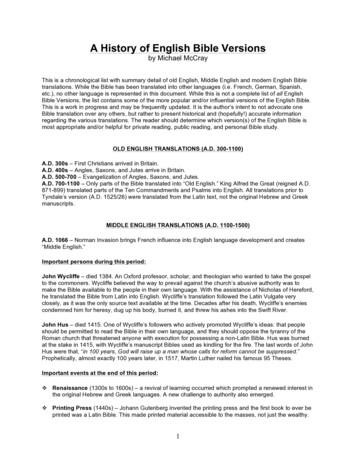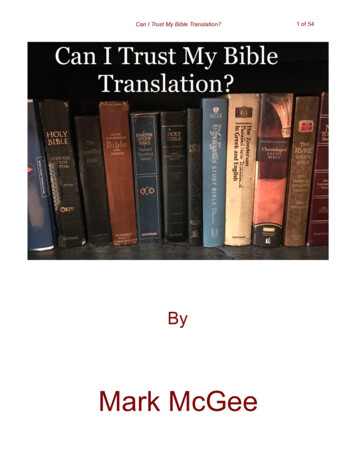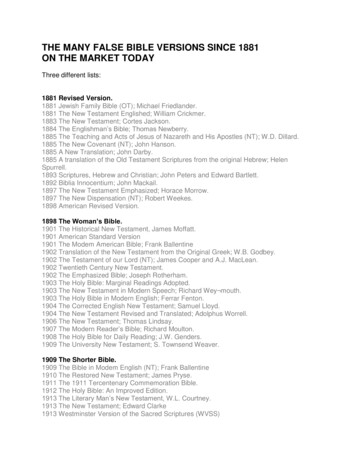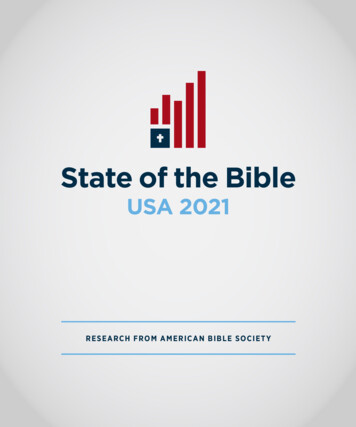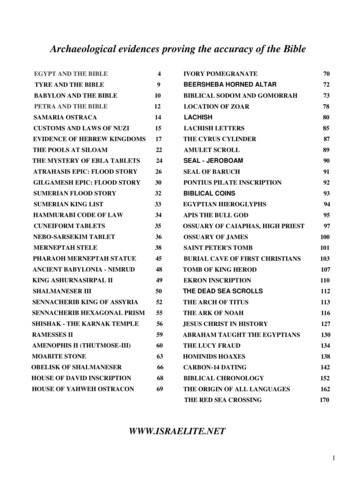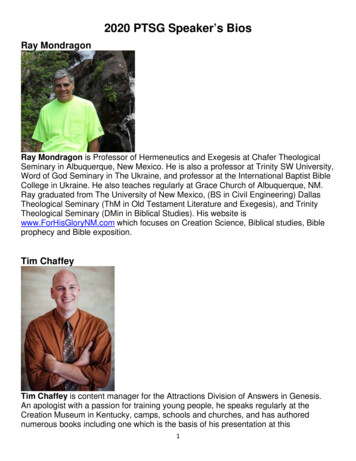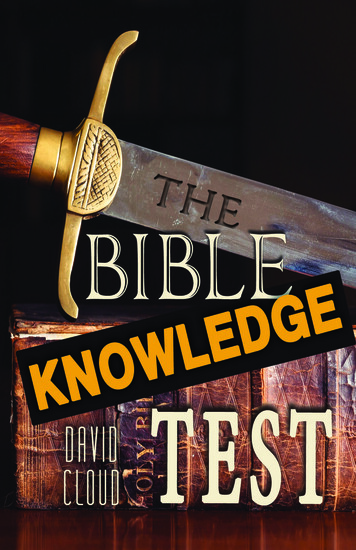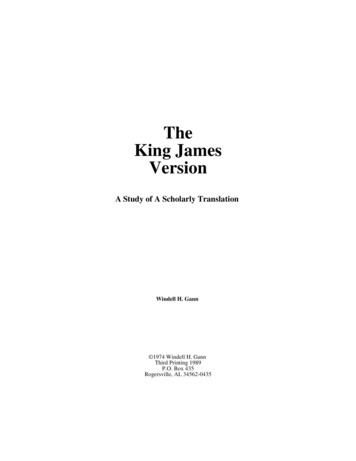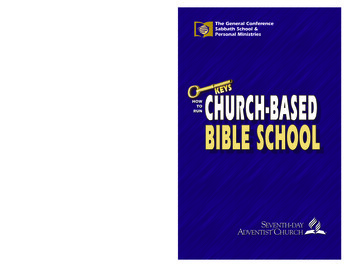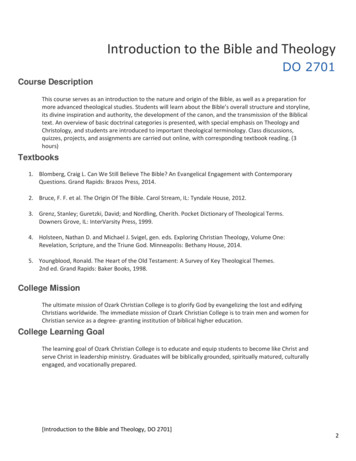
Transcription
Introduction to the Bible and TheologyDO 2701Course DescriptionThis course serves as an introduction to the nature and origin of the Bible, as well as a preparation formore advanced theological studies. Students will learn about the Bible’s overall structure and storyline,its divine inspiration and authority, the development of the canon, and the transmission of the Biblicaltext. An overview of basic doctrinal categories is presented, with special emphasis on Theology andChristology, and students are introduced to important theological terminology. Class discussions,quizzes, projects, and assignments are carried out online, with corresponding textbook reading. (3hours)Textbooks1. Blomberg, Craig L. Can We Still Believe The Bible? An Evangelical Engagement with ContemporaryQuestions. Grand Rapids: Brazos Press, 2014.2. Bruce, F. F. et al. The Origin Of The Bible. Carol Stream, IL: Tyndale House, 2012.3. Grenz, Stanley; Guretzki, David; and Nordling, Cherith. Pocket Dictionary of Theological Terms.Downers Grove, IL: InterVarsity Press, 1999.4. Holsteen, Nathan D. and Michael J. Svigel, gen. eds. Exploring Christian Theology, Volume One:Revelation, Scripture, and the Triune God. Minneapolis: Bethany House, 2014.5. Youngblood, Ronald. The Heart of the Old Testament: A Survey of Key Theological Themes.2nd ed. Grand Rapids: Baker Books, 1998.College MissionThe ultimate mission of Ozark Christian College is to glorify God by evangelizing the lost and edifyingChristians worldwide. The immediate mission of Ozark Christian College is to train men and women forChristian service as a degree- granting institution of biblical higher education.College Learning GoalThe learning goal of Ozark Christian College is to educate and equip students to become like Christ andserve Christ in leadership ministry. Graduates will be biblically grounded, spiritually matured, culturallyengaged, and vocationally prepared.[Introduction to the Bible and Theology, DO 2701]2
College Learning OutcomesOzark has identified learning outcomes for each area of the curriculum – General Education (GE), BiblicalEducation (BE), and Professional Education (PE). This course will directly address the following collegelearning outcomes:General Education Outcomes:GE 2: Think critically from a Christian worldview.GE 6: Integrate learning and experiences to new settings and complex problems.Biblical Education Outcomes:BE 1: Know the historical and theological content of the Bible.Course ObjectivesUpon completion of this course learners should be able to:1.2.3.4.5.Articulate the story of the Bible in a way that reflects the unity of its overall structureDescribe and defend the divine inspiration of the BibleDemonstrate the implications of Biblical authority for personal life and ministryExplain the process by which the canon of the Bible was formedAssess the state of the Biblical text and weigh arguments against the text’s reliabletransmission6. Compare and contrast basic categories of doctrinal study7. Recall the meanings of numerous terms used in theological studies8. Compile and summarize Biblical teaching on a chosen area of doctrineInformation LiteracyOzark Christian College is committed to information literacy training. This training will be intentional, incremental,and missional. Students will learn to access, evaluate, and utilize pertinent information in their ministrypreparation.ADA AccommodationIf you have a disability and are requesting an accommodation, please contact the Dean of Online Learning at 417626-1234 Extension 2007 as soon as possible.[Introduction to the Bible and Theology, DO 2701]3
Online Course PoliciesTurnitinOzark Christian College contracted with iParadigms, LLC for Turnitin services to be used at the instructor’sdiscretion. The Originality Check service allows students to submit a paper through Canvas to check for impropercitation and potential plagiarism before it is submitted to the instructor. The Peer Review service allows studentsto submit assignments anonymously to peers for editing and feedback. Students agree that by taking this courseall required papers may be subject to submission for textual similarity review to Turnitin.com for the detection ofplagiarism. All submitted papers will be included as source documents in the Turnitin.com reference databasesolely for the purpose of detecting plagiarism of such papers. Use of the Turnitin.com service is subject to theUsage Policy posted on the Turnitin.com site.OCC Student Email AddressAll Ozark Christian College students must use the official e-mail address provided by the college(lastname.firstname@my.occ.edu) to receive communication from the faculty and staff. The OCC student e-mailaddress may be forwarded to another e-mail service (e.g. yahoo.com or hotmail.com). Email will be theprofessor’s chosen method of communication with the student in this course, so check your email regularly.Online Course Refund PolicyRefunds of tuition and certain fees may be made upon official withdrawal of any student according to the tablebelow. To receive a refund adjustment for any classes dropped, less an administration fee, the student shouldcontact the Dean of Online Learning at lindsay.shawn@occ.edu. See the website for specific dates.Week 1: Monday-Sunday100% refundWeek 2: Monday-Sunday75% refundWeek 3: Monday-Sunday50% refundWeek 4: Monday-Sunday0% refundOnline Course Drop PolicyOnline courses dropped during the first four days of the course will not be recorded on the student’s transcript.Any student who wishes to withdraw from a class after the Add/Drop period must notify the Dean of OnlineLearning or the Registrar’s Office and formally request to be withdrawn from the class(es). Until this is done, thestudent is officially enrolled in the class whether or not he/she participates. Likewise, the student is responsible forappropriate charges and coursework until he/she is officially removed from the course.Online courses withdrawn after the fourth day but before the sixth week of the course will be recorded as a “W”on transcripts. This grade will not be calculated in the student’s GPA but will impact financial aid SatisfactoryAcademic Progress. After five weeks, students cannot drop or withdraw from online courses and grades will beissued based on course performance. The only exception is for reasons approved by the Dean of Online Learning.[Introduction to the Bible and Theology, DO 2701]4
Online Course AttendanceOnline courses often demand greater discipline and careful attention to details within a compressed period of timecompared to on-campus courses. Students are strongly advised to remain in close contact with their onlineinstructor in the event that they must be absent for a brief period of time. Attendance in online courses will betaken on a weekly basis. Students will be expected to actively participate according to the individual coursesyllabus.Participation may include, but not be limited to: submitting written assignments, posting in graded forumdiscussions, completing exams, and written communication with the instructor directly related to the course.Online students who do not participate in the above ways for seven consecutive days will be considered absent.Students are permitted a maximum of one absence.The following scenarios may negatively impact a student's academic record and financial aid opportunities.1. Being administratively dropped due to lack of login or participation within the first four days of an onlinecourse. Online Learning Department personnel will contact students via their OCC student email accountand/or current phone number to assist them prior to this deadline.2. Missing twelve consecutive days. The student will be contacted by the instructor via the student’s OCCemail account. Instructors will promptly convey this information to the Dean of Online Learning. Thestudent will be given 48 hours to communicate his/her intentions. Those who do not respond, or who donot wish to continue in the course, will be administratively withdrawn.3. Acquiring a second absence after the fifth week. Students who exceed the absence limit (one) without theconsent of the online instructor will fail the course. If a student exceeds the absence limit within the firstfive weeks, he/she may elect to withdraw from the course.Assignment SubmissionAll assignments will be facilitated through our Canvas course site. You may post replies to the discussions forums,as well as take quizzes and exams. For written assignments, save documents in either .doc, .docx, .pdf, or .rtfformat (or as otherwise indicated by your instructor) and upload them to the Canvas site.Late WorkAssignments are due on Thursday and Sunday by 11:59 pm Central Standard Time. Late work may or may not beaccepted, at the discretion of the teacher. Any grade deductions will be assessed on a case-by-case basis. If youhave a question about a particular assignment, please contact the teacher well ahead of the deadline.Responses to Your WorkYou may generally expect replies to personal communication (email, Canvas inbox) within 24-48 hours. For writtenassignments, the professor will endeavor to grade and give feedback within seven days of the due date.Academic HonestyDue to the commitment of training men and women for Christian service and the commitment of educationalexcellence, academic integrity is our natural expectation. Compelling evidence of academic dishonesty (e.g.cheating or plagiarism) will be reported to the academic dean’s office and the student development office.Penalties could range from failure of an assignment to suspension from college. Students should avoid dishonestyand irresponsibility at all costs.[Introduction to the Bible and Theology, DO 2701]5
Required Course Tools/ConnectivitySuccessful participation in this course requires the student to possess or obtain (and know how to use) thefollowing in addition to course books: One fully functional and adequately performing desktop or laptop computer, free of known viruses. A word processor that can publish or save into .doc, .docx, .pdf, or .rtf format. Access to your @my.occ.edu email address. Daily access to a reliable internet connection of at least 1MB/s speed. A webcam and mic (typically integrated on most laptops).Course Topic Outline and WorkloadIn keeping with standards typical of higher education, the expectation is that you will spend between 112 to 135hours completing all coursework in this 3-hour online course.Module Topics Covered2What is the Bible all about? (Books of the Bible,Storyline of the Bible, Unity of the Bible)What kind of book is the Bible? (HistoricalTrustworthiness)3What kind of book is the Bible? (Divine inspirationand authority)14567How did the Bible books come together? (formationand history of the canon of the Old and NewTestaments)How did the Bible come down to us? (history oftextual transmission of both Old and NewTestaments)What are the major doctrinal categories in the Bible(Introduction to Theological studies, Theology andAnthropology)What are the major doctrinal categories in theBible? (Christology, Pneumatology, and Soteriology)What are the major doctrinal categories in the Bible?(Ecclesiology and Eschatology)Total Hours Students will Spend Working on CourseAssignments (120-135 Total)8[Introduction to the Bible and Theology, DO 2701]Hrs./Min.Covered17.5 hr.16.25 hr.16 hr.13.5 hr.14.25 hr.15.25 hr.16 hr.14.75 hr.123.5 hr.6
GradesBelow is a listing of assignments that comprise the 100% percentage points possible for thiscourse.AssignmentWelcome ExerciseAssignments/ProjectsQuizzesGraded DiscussionsResearch AssignmentsReadingTotal PointsGrade20 points400 points180 points300 points50 points50 points1000 pointsCourse Obj.1, 2, 3, 41, 6, 72, 38Grading ScaleTotal Score100-95 points94-93 points92-91 points90-87 points86-85 points84-83 points82-79 points78-77 points76-75 points74-72 points71-70 points69-0 pointsFor further information on grading policies,refer to the college catalog.[Introduction to the Bible and Theology, DO 2701]CourseGradeAAB BBC CCD 70.007
[Introduction to the Bible and Theology, DO 2701] 2 Course Description Introduction to the Bible and Theology DO 2701 This course serves as an introduction to the nature and origin of the Bible, as well as a preparation for more advanced theological studies. Students wil
